After a historic vote not to call witnesses in Trump's impeachment trial, the Senate is scheduled for a final vote on Wednesday
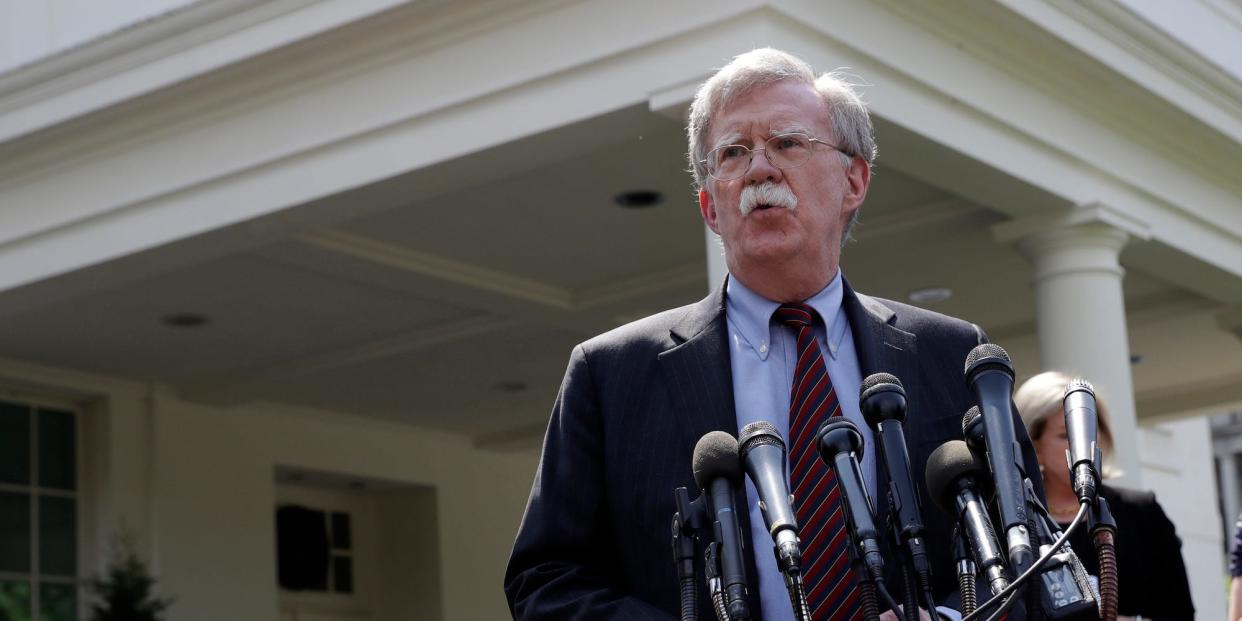
Andrew Harnik/AP
The Senate reconvened Friday to debate whether to call additional witnesses forward in President Donald Trump's impeachment trial.
After several hours of debate, the Senate blocked a measure to call new witnesses, with 49 senators voting for it and 51 against.
The schedule for the rest of Trump's impeachment trial is now up in the air as the Senate figures out how to "land the plane," according to one Republican senator.
Scroll down to watch the trial and follow Insider's live coverage.
The Senate on Friday officially blocked a measure to call additional witnesses in President Donald Trump's impeachment trial.
The move came after a contentious debate during which House impeachment managers argued that the Senate has a duty to hear testimony from firsthand witnesses, like former national security adviser John Bolton, who can provide new evidence in Trump's trial.
The president's lawyers, meanwhile, argued that the Senate already has enough information from the 17 witnesses who testified in the House's impeachment inquiry.
Friday's proceedings came after The New York Times reported on another bombshell claim from Bolton's upcoming book, in which Bolton claims Trump personally asked him to help pressure Ukraine to cave to his personal demands.
The House of Representatives impeached Trump last month for abuse of power and obstruction of Congress. The two articles of impeachment relate to the president's efforts to strong-arm Ukraine to deliver politically motivated investigations targeting his rivals.
While doing so, Trump withheld $391 million in military aid to Ukraine and dangled a White House meeting that Ukrainian President Volodymyr Zelensky desperately sought and still hasn't gotten.
Fifty-one senators need to vote in favor of calling witnesses for the motion to pass. There are currently 45 Democrats, two independents who caucus with Democrats, and 53 Republicans in the Senate.
That means four Republican senators need to side with the Democratic caucus for the Senate to call witnesses.
In the Republican caucus, only Sens. Mitt Romney of Utah and Susan Collins of Maine have publicly indicated they would vote in favor of calling witnesses to testify.
Sen. Lamar Alexander of Tennessee, once considered a possible pro-witness Republican, announced Thursday night that he would not vote in favor of witnesses.
Sen. Lisa Murkowski of Alaska, another closely-watched potential swing vote on the matter, confirmed Friday afternoon that she will also vote against calling more witnesses.
Watch the trial below:
Scroll down to follow Insider's live coverage of the trial.
The Senate voted to reconvene on Monday for closing arguments, senators will get to speak on Tuesday, and a final vote is scheduled for Wednesday.
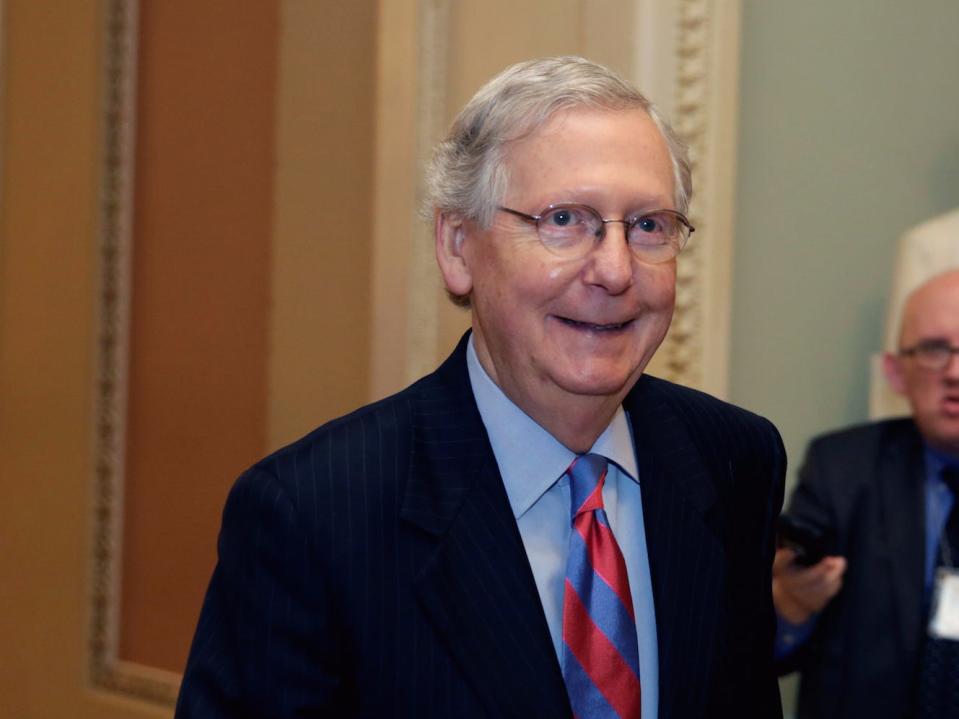
Reuters
Monday is also the Iowa caucuses (four senators, Sanders, Warren, Klobuchar, and Bennet, are running for president). Tuesday is President Donald Trump's State of the Union address.
Minority Leader Chuck Schumer offers up amendments, including attempts to subpoena witnesses and documents.

Associated Press
The Senate reconvened on Friday night, as the schedule going forward with the impeachment trial firms up: The Senate will vote on both articles of impeachment on Wednesday.
On Friday night, Sen. Schumer offered up several amendments related to subpoenaing documents and witnesses. Ahead of the votes on the amendments, Chief Justice Roberts clarified that he would not break a tie in the Senate, as he is not an elected official.
While all four amendments failed, it again put senators on record regarding documents and witnesses.
The Senate's impeachment trial schedule is now up in the air
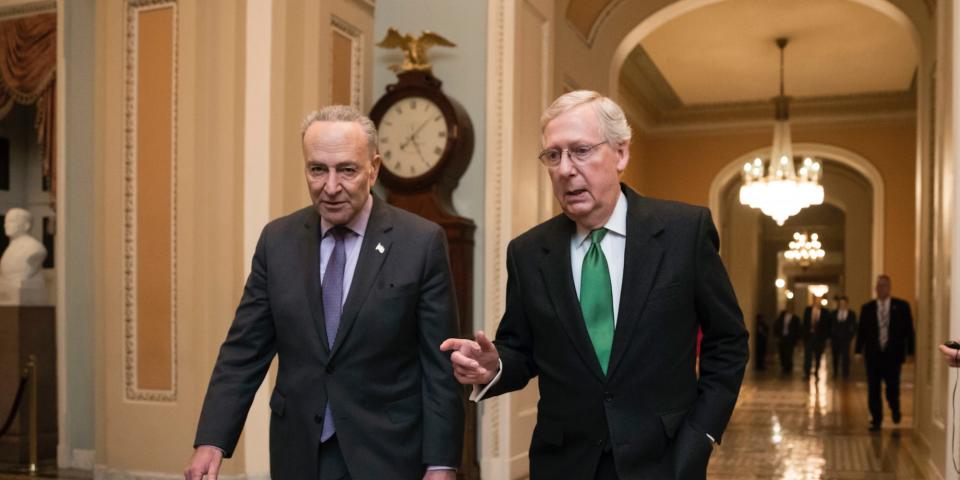
Associated Press/J. Scott Applewhite
Senate Majority Leader Mitch McConnell motioned for a recess after the vote but didn't indicate what the schedule would look like going forward.
"Senators will now confer among ourselves, with the House managers, and with the president's counsel to determine next steps as we prepare to conclude the trial in the coming days," McConnell told reporters.
Senate Minority Leader Chuck Schumer also said he would meet with Democrats to game out how to move forward.
But right now, according to Sen. Joe Manchin of West Virginia, "nobody has any idea" what's going to happen next.
"We're still trying to figure out how to land the plane," Republican Sen. John Thune said.
Senate votes against calling witnesses in 51-49 vote killing the measure
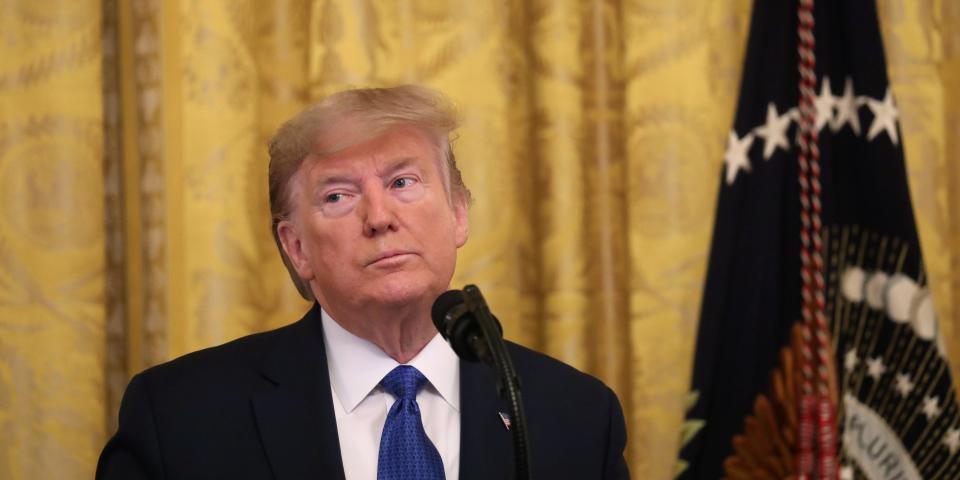
ReutersProsecutors and defense lawyers conclude their debate on witnesses, and a Senate vote on the matter is coming up

AP Photo/J. Scott Applewhite
The Republican-controlled Senate is widely expected to vote against calling new witnesses after two key Republican senators seen as swing votes — Lisa Murkowski of Alaska and Lamar Alexander of Tennessee — announced they would not vote to have more witnesses testify.
In order for the motion to call witnesses to pass, four Republican senators need to defect from their party and join Democrats and two independent senators to reach a 51-vote threshold.
But only two Republican senators, Susan Collins and Mitt Romney, have said they will vote in favor of calling new witnesses.
Lead House manager Adam Schiff takes a shot at Trump defense lawyer Alan Dershowitz for promoting the 'principle of constitutional lawlessness'
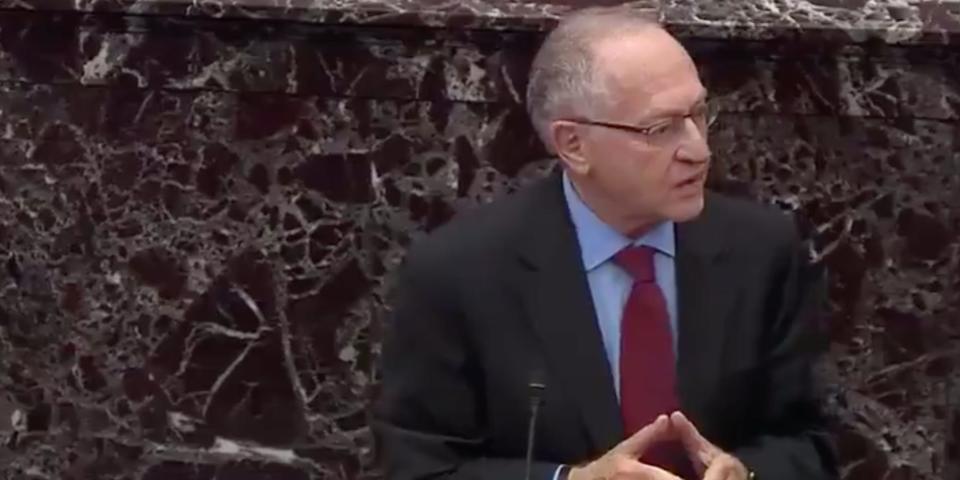
Screenshot via ABC News/Senate TV
Lead House manager Adam Schiff characterized the Trump defense team's argument as implying the president "has a God-given right to abuse his power, and there's nothing you can do about it."
"It's the Dershowitz principle of constitutional lawlessness," Schiff said, referring to Harvard law professor Alan Dershowitz, one of Trump's defense attorneys in the impeachment trial.
"That's the end-all argument for them," Schiff added. "You don't need to hear witnesses who will prove the President's misconduct because he has a right to be as corrupt as he chooses under our Constitution. And there's nothing you can do about it."
Dershowitz made headlines earlier this week when he argued that Trump's conduct is not impeachable because he believes his re-election is in the public interest.
Dershowitz, who has defended controversial figures like OJ Simpson and Jeffrey Epstein, faced harsh blowback afterward from observers who said he was essentially arguing that politicians can do whatever they want to get elected.
Dershowitz later claimed he never said what the public heard him say.
"I did not say or imply that a candidate could do anything to reassure his reelection, only that seeking help in an election is not necessarily corrupt, citing the Lincoln and Obama examples," he tweeted. "Critics have an obligation to respond to what I said, not to create straw men to attack."
Fact check: It's not a straw man. Here are Dershowitz's exact words: "If a president does something which he believes will help him get elected — in the public interest — that cannot be the kind of quid pro quo that results in impeachment."
Trump counsel Patrick Philbin says Trump blocked Congress' impeachment inquiry because he wanted to 'defend the separation of powers'

Reuters
Deputy White House counsel Patrick Philbin called the articles of impeachment against Trump "defective on their face."
Referring to the second article, which charges Trump with obstruction of Congress, Philbin said the charge "is really trying to say that it's an impeachable offense for the president to defend the separation of powers."
"No witnesses are going to say anything that makes any difference to the second article of impeachment," Philbin added.
Fact check: The legislative branch is constitutionally tasked with the power to conduct oversight of the executive branch. Trump has not cooperated with a single congressional investigation, including the impeachment inquiry.
In addition to issuing a sweeping directive ordering all executive branch officials and six federal agencies from providing any witness testimony or documents in the impeachment investigation, the president and his lawyers have also filed multiple lawsuits to stop congressional committees from obtaining any information about his presidential campaign, taxes, business dealings, or his time in office.
Trump's defense lawyers argue that he has "absolute immunity" — a nonexistent legal concept — from not just prosecution but any investigation while he's in office.
The president has also falsely asserted that Article 2 of the Constitution gives him the power to "do whatever I want."
Trump's lawyers argue he did nothing wrong while urging Senate to vote against witnesses who could provide evidence of Trump's misconduct

Screenshot via C-SPAN 2/Senate TV
After House managers wrapped up their remarks, it was Trump's team's turn.
Patrick Philbin, the deputy White House counsel and one of the lawyers defending the president, opened his presentation by suggesting it was absurd for the House managers to say a trial cannot be fair or complete without witnesses and documents, "as if it's just that simple."
Philbin added that the managers invoked that argument as a "trope ... to disguise the real issues."
He went on to say that before addressing the question of witnesses and documents in "any legal system," a court first has to decide if there's "even a triable issue."
Fact check: The question of whether there's a "triable issue" has already been addressed. The House of Representatives' move to impeach Trump is akin to handing down a criminal indictment, meaning lawmakers believe the president engaged in impeachable conduct.
The Constitution confers upon the Senate the "sole power to try" impeachment cases. It does not specify that the Senate must hold a trial, but current Senate rules indicate that it would.
Lead House manager Adam Schiff addresses the Senate: 'You know, as well as we, that there are others you should hear from'
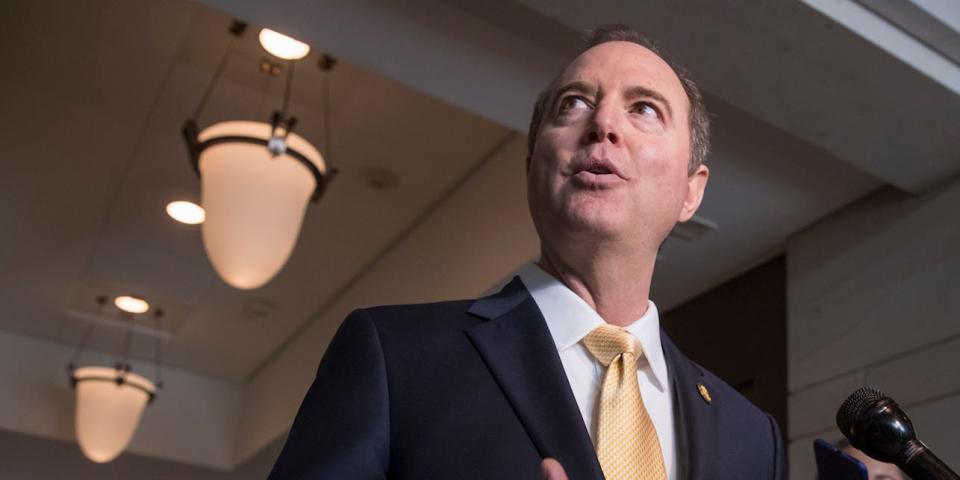
Rep. Adam Schiff of California, the lead House impeachment manager and the chairman of the House Intelligence Committee, closed out his remarks Friday afternoon by saying that a "trial without witnesses is no trial at all."
"You know, as well as we, that there are others you should hear from," Schiff said, addressing the Senate.
Here are the 4 witnesses Democrats want to call and why each one is relevant
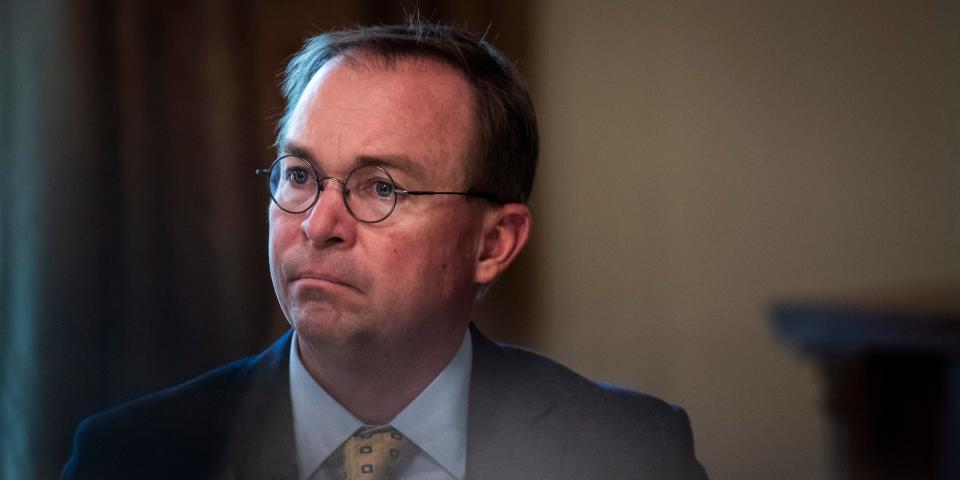
Jabin Botsford/The Washington Post via Getty Images
Former national security adviser John Bolton
Bolton is a key figure in several events at the center of Trump's impeachment. He was at a July 10 meeting during which Gordon Sondland, the US's ambassador to the EU, pushed Ukrainian officials to deliver the political investigations Trump wanted in exchange for a White House meeting for Zelensky.
Bolton will reportedly reveal in his upcoming book that Trump directly told him he would withhold Ukraine's aid until the country gave in to his demands for investigations.
The former national security adviser also claims Trump asked him during a meeting in May to call Zelensky and push him to meet with Giuliani, who was spearheading Trump's pressure campaign.
Acting White House chief of staff Mick Mulvaney
Bolton claims Mulvaney was present at the May meeting in which Trump asked him to call Zelensky.
Mulvaney is also the head of the Office of Management and Budget, which took on a lead role in carrying out Trump's order to freeze Ukraine's aid. Emails and other documents also indicate that Mulvaney was in the loop on Trump's decision to withhold Ukraine's military aid from the start.
Mulvaney publicly acknowledged last year that part of the reason the White House froze the security assistance was because Trump wanted Zelensky to investigate a conspiracy theory about Ukrainian election interference that targets the Democratic Party.
Robert Blair, an aide to Mulvaney
Blair has direct knowledge of Mulvaney's involvement in the Ukraine pressure campaign.
The New York Times reported that early on as Trump debated withholding aid, Blair wrote to Mulvaney in an email that the administration should "expect Congress to become unhinged" if the White House tried to pull back spending that was approved in Congress.
Michael Duffey, an OMB official
Duffey officially ordered the freeze in Ukraine's aid 91 minutes after Trump's phone call with Zelensky on July 25.
Duffey wrote that based on "guidance" he had gotten and in "light of the Administration's plan to review assistance to Ukraine … please hold off on any additional DoD obligations of these funds, pending director from that process."
House impeachment managers dig in on calling witnesses after Murkowski deals a fatal blow to the motion

Screenshot via C-SPAN 2/Senate TV
House manager Val Demings displayed the graphic above as she emphasized that the Senate had called witnesses in every one of the 15 previous impeachment trials in US history.
Murkowski explains her decision to vote against calling witnesses: 'Given the partisan nature of this impeachment from the very beginning and throughout, I have come to the conclusion that there will be no fair trial in the Senate'
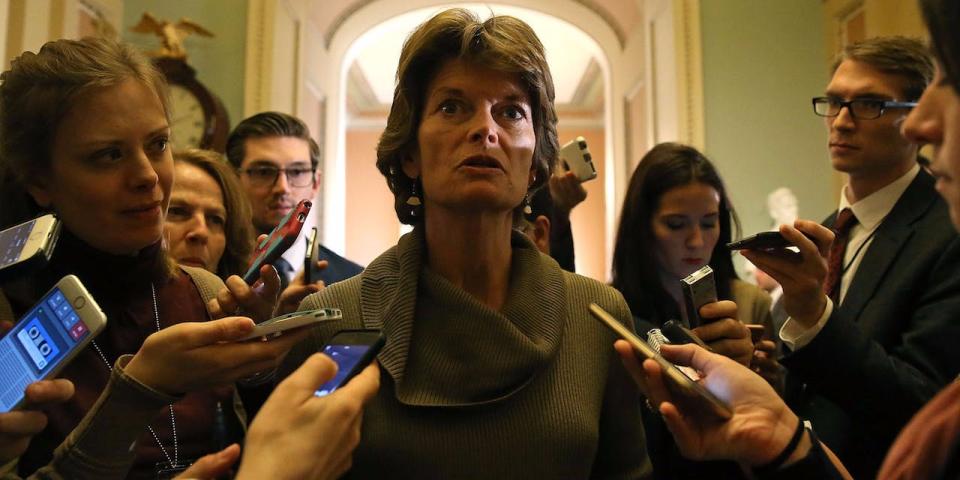
Mark Wilson/Getty Images
Here's her statement:
"I worked for a fair, honest, and transparent process, modeled after the Clinton trial, to provide ample time for both sides to present their cases, ask thoughtful questions, and determine whether we need more.
"The House chose to send articles of impeachment that are rushed and flawed. I carefully considered the need for additional witnesses and documents, to cure the shortcomings of its process, but ultimately decided that I will vote against considering motions to subpoena.
"Given the partisan nature of this impeachment from the very beginning and throughout, I have come to the conclusion that there will be no fair trial in the Senate. I don't believe the continuation of this process will change anything. It is sad for me to admit that, as an institution, the Congress has failed.
"It has also become clear some of my colleagues intend to further politicize this process, and drag the Supreme Court into the fray, while attacking the Chief Justice. I will not stand for nor support that effort. We have already degraded this institution for partisan political benefit, and I will not enable those who wish to pull down another.
"We are sadly at a low point of division in this country."
Here's what Bolton says in his upcoming book
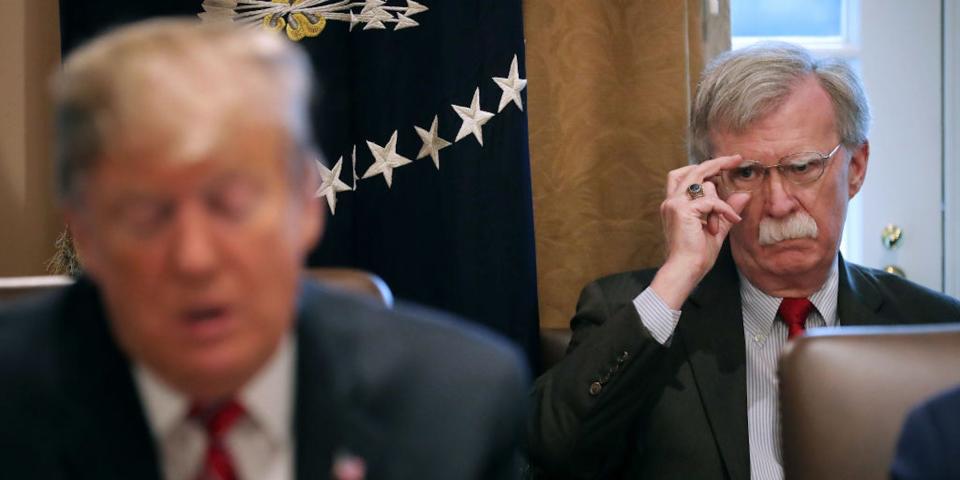
Chip Somodevilla/Getty Images
According to The Times, Trump asked Bolton during a meeting in May — shortly after Zelensky was elected — to call Zelensky to ensure he would meet with Rudy Giuliani, Trump's personal lawyer.
At the time, Giuliani was planning a trip to Ukraine to push Zelensky to deliver two politically motivated investigations that Trump wanted. The first targeted former Vice President Joe Biden, who had recently launched his 2020 campaign, and his son, Hunter, related to Hunter Biden's employment on the board of the Ukrainian natural-gas company Burisma Holdings.
The second was an investigation into a bogus conspiracy theory, pushed by Russia, that suggested Ukraine interfered in the 2016 US election.
Bolton claims Giuliani, the acting White House chief of staff Mick Mulvaney, and the White House counsel Pat Cipollone were present at the meeting when Trump asked him to call Zelensky.
Cipollone is currently leading Trump's defense in his Senate impeachment trial, raising the possibility that the president's chief defense lawyer is also now a potential witness to his alleged misconduct.
Read the original article on Business Insider

